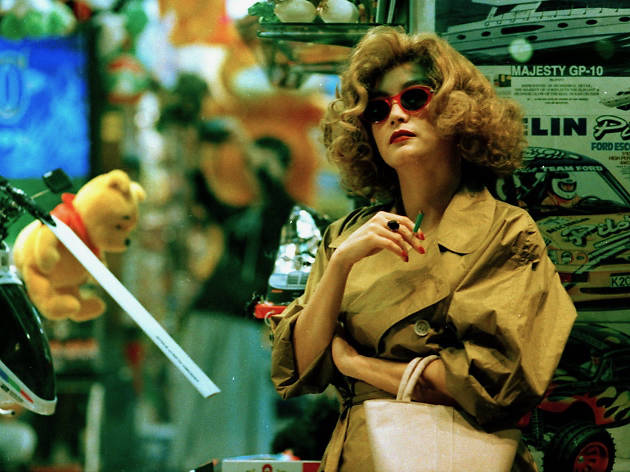The parallels between He Qiwu and Cop 663 in Wong Kar-wai’s Chungking Express (1994) are hard to miss: though both are policemen, their work becomes altogether irrelevant to their lives as heartsick ex-lovers. As they attempt to unstick their hearts from the past, both men are as pathetic as they are charming. Neither of their new romances resemble traditional relationships, but their impromptu, abrupt, encounters with near-strangers are poignant nonetheless. The vibrant, chaotic backdrop of Hong Kong—which Wong Kar-wai portrays through the bright, popping colors of disco bars and the dull hues of cramped apartments—leads us to question whether either character’s nostalgia even has a place in the disconcertingly fast-paced and cosmopolitan setting of Hong Kong. Is it possible to be heartbroken in a modern world? And when one is left behind in a relationship, what might it mean to move on?
Chungking Express begins with a series of “smudged” shots of Qiwu chasing down a criminal—seemingly seen through the eyes of someone who is drunk, in love, or in some other impaired state that would alter perception of time. As garishly lighted signs, store windows, and pieces of clothing blend together to form a throbbing palette of the city, the distinction between pedestrians and buildings becomes blurred: to Qiwu, the people are simply physical obstructions between him and his man. The camera’s switching between the perspective of Qiwu, the criminal, and various bystanders further impairs our understanding of what’s happening. Images coalesce and there is no clear beginning nor end to any single movement, making it difficult for us to distinguish a past, present, and future. For me, this “smudging” technique recalled Orson Welles’ use of dissolves in Citizen Kane—the vestiges of one shot mingling with the next similarly discourages an unambiguous, linear understanding of time. In a voiceover, Qiwu introduces himself in the present tense, and his knowledge that he encounters the woman he would later come to love clearly situates this scene in the past. Does the smudging represent the way an adrenaline-fueled Qiwu perceived his surroundings, as the heroic cop chasing down a criminal? Or perhaps, does it demonstrate how his present awareness of the woman he fell in love with distorted and “smudged” his memory? The latter possibility further deters a linear reading of time, as it shows that Qiwu’s present changes the way he views past events.
After being dumped by his girlfriend May, Qiwu gorges himself on anything that is available in mass quantity and destined to expire. As he frequents a bar, convenience store, and any space that will accommodate his aimless, 24-hour lifestyle, Qiwu clashes with people who fail to comprehend his yearning for the past: he disregards a store owner who urges him to date someone new, quibbles with a convenience store attendant about the value of expired food, and is rebuffed by a street bum who refuses the expired can Qiwu offers him. One shot from the montage of Qiwu calling every girl he knows is strikingly representative of his condition: the bold lines of the semi-closed store make Qiwu look trapped, while the canted angle sets him visibly at odds with the rest of the world. After emerging from a relationship, Qiwu is not only detached from the rest of the world, his perception of time is also warped.
Qiwu’s counterpart is Cop 663, who, either due to his general cluelessness or broken heart, fails to realize that his love interest Faye is breaking into and renovating his home. Faye adjusts her own routine to his work schedule as she refurbishes his dingy apartment, but her behavior indicates that it’s more about her enjoyment than it is about his. She makes his apartment into her personal playground as she casually tosses a weight onto a threadbare armchair, rolls around in his bed, and leaves one of his prized model airplanes in a fishtank; her relishing her control over his life is undeniable. One of these scenes is set to Faye’s favorite tune, the lighthearted bop “California Dreamin” and its backlighting gives the apartment an ethereal and seemingly endless afternoon glow. With its rapid cuts, handheld quality, and music video aesthetic, the camera adapts a persona that is as carefree, careless, and playful as Faye as she replaces ragged towels and worn-down pieces of soap. Cop 663, however, remains convinced that his household possessions fundamentally remain the same as they were when his ex lived with him. Does his obliviousness to the physical reminders of time passing in his domestic life highlight his familiarity with being served or his helplessness in his love life?
Each character’s differing perception of time ultimately communicates Wong Kar-wai’s remarkably nuanced understanding of gender relations. His two male characters seem to have been born in the wrong decade, especially when compared to the women they orbit around. As a home intruder, love interest, flight attendant, and world traveler, Faye’s roles are many, and the blonde lady’s physical disguise leads us to believe that there is another dimension to her that we don’t see—indeed, the women of Chungking Express live through taking on different characters. Ultimately, the women’s fluid identities and dynamic decision-making indicates their hyper awareness of the the limits of time, while the men sit around clocking the hours or failing to see the changes that happen in front of their eyes. Perhaps the women are better equipped to handle the business of living and loving in modern-day Hong Kong.


